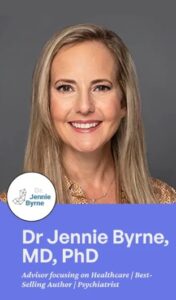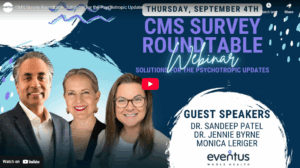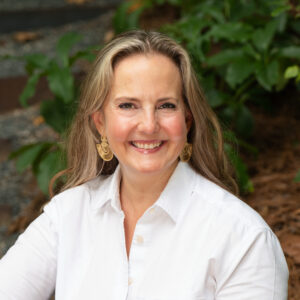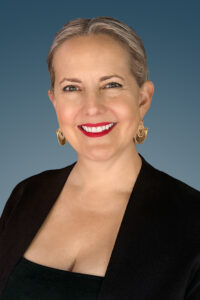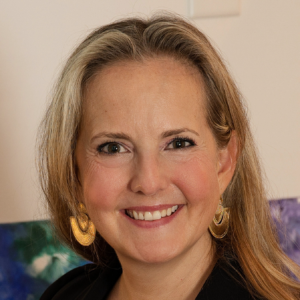Meet Jennie Byrne
Many healthcare professionals might find Jennie Byrne’s story familiar: the constant balancing act between clinical practice, personal life, and the drive to innovate in a field that often seems resistant to change.
When I saw Jennie’s LinkedIn posts about moral injury in healthcare, including her new book on the topic, I knew I wanted to interview her. Jennie kindly offered her time within her busy schedule and shared her career journey.
In our short time together, I found a health professional with a deep understanding of the human mind, both as a psychiatrist and neuroscientist, and an ability to turn challenging situations into opportunities for growth and new beginnings. Her career is marked by a series of turning points that have led her to not only redefine her professional path but also to help others navigate their own.
From Music Major to Neuroscience
You would think Jennie’s career began with a fierce young determination to be a doctor. However, I was surprised to learn that Jennie started as a freshman in music, then switched to French as a sophomore.
But it was in junior year that I took a brain and behaviour class and then I just fell in love.
So, she began doing some research and was encouraged to pursue a PhD program. A lab colleague was actually the one who encouraged Jennie to consider an MD PhD program, “and again, being young and naive, I thought sure. I’ll do that”.
Jennie’s academic journey was anything but easy. She completed her MD and PhD at NYU, focusing her research on the neural mechanisms underlying attention. Her PhD research was challenging, particularly when it came to the game of publishing, a part of scholarly life I, too, never really liked. But despite the setbacks, her scholarly foundation would later inform her approach to understanding patients’ emotional and behavioural issues in clinical settings.
But at this point, Jennie envisioned a future in academia, immersed in research. It was psychiatry that eventually captured her heart and mind. Jennie recalled her fascination with the therapeutic process despite her initial scepticism about its effectiveness. While neurology and neurosurgery interested her, psychiatry appealed to her more due to its culture and the potential for greater practitioner freedom.
“I found psychiatry it intriguing and liked that you could be a little more eccentric or have a little more personality”.
It seemed to me that Jennie already knew she didn’t want to be defined and confined like some cultures can appear to offer and needed less of a cookie-cutter pathway.
Thirteen years later, after completing her three degrees, Jennie began her four-year residency in psychiatry in New York. Residency was a rigorous, demanding period where she continued to do research. “I did my elective time in research, including a functional MRI lab with patients with schizophrenia. So again, I wrote a paper, I did some nice research, and I liked writing, but what I discovered is that you spend so much time writing grants and peer review papers, and I just had no patience for the back-and-forth politics of getting published”.
Balancing Family and a Burgeoning Career
By this time, Jennie had a toddler in tow, an introduction to motherhood fraught with the challenges of premature birth yet the benefits of working in the same building as her child. Jennie and her husband decided that New York City wasn’t conducive to their growing family or the lifestyle they wanted. So they decided on North Carolina, where she transitioned to a practice doing what was considered innovative at the time: seeing geriatric patients either in their homes or in assisted living premises.
Intent on enjoying the years beyond toddlerhood with her now two children, Jennie decided to start her own private practice to give her the flexibility she wanted for her family life. Through continuous growth, the solo practice became a small business of eight therapists and three full-time administrative staff. This was not what she set out to do.
I certainly had no training in running a business, so there was a lot to learn; I liked this new challenge.
Jennie shares the inner wrestling she experienced regarding payment structures and business models. She had opted for a cash practice, which means no insurance claims, to pay her and her fellow practitioners what they were worth. Jennie had two little kids and a ton of student debt, and quite simply, the reality is that “there are times you just need to make money.”
Jennie’s reflection on her practice approach makes me think that we all care and want to do the right thing. And there are simply so many different ways to care. Here in Australia, we certainly have similar challenges, some more based on not wanting to appear to be a health professional focused on money. Culture influences how we relate to and talk about money in our careers. I wonder what more would open up if we challenged our fears and notions around doing good and making money?
“It was incredibly difficult to make that decision, and I felt a lot of guilt about it,” Jennie shared, her voice reflective. “But then I realised everyone deserves good care, regardless of their financial status. Wealthy patients need the same quality of care as anyone else. There’s so much need in psychiatry, and some of the wealthiest patients I treated were among the sickest.”
Jennie got involved in a state-level Medicaid project as a medical director to give in other ways and supplement her income when the practice was starting. This role allowed her to use her expertise to improve healthcare systems and support primary care practices across the state with mental health models of care. It was a fulfilling role. Yet it also highlighted to Jennie how outdated the service and payment models were and what role tech and AI can have in alleviating some of the burden.
Most people don’t realise there are so many ways to practice healing.
A Life-Altering Diagnosis
Just as Jennie was finding her stride, balancing the demands of her private practice and the Medicaid project, life threw her a curveball that would change everything.
Jennie’s husband was diagnosed with multiple sclerosis (MS), a condition that would alter their lives in ways they could never have anticipated.
Everything was back on the table. We didn’t know what was going to happen.
This diagnosis forced Jennie to reevaluate her career and her role within her family. Suddenly, the need for stability and a higher income became paramount. She made the difficult decision to sell her practice and leave the Medicaid project to seek an executive-level role that could provide the financial security her family needed.
Through her networking efforts and pushing herself out of her comfort zone, she was offered a national executive role at CareMore, a well-known company in value-based care. She held the Chief Behavioural Health Officer position for a couple of years, quickly adapting to the demands of the position, learning and growing rapidly.
Despite her initial reservations, Jennie found a supportive and passionate community at CareMore.
I thought I would become a bad person working for a health plan, but they were just like everyone else, trying to make it work.
This realisation helped Jennie to see that her values and those of her colleagues were aligned, and she found herself thriving in the role.
Her time at CareMore was a period of immense professional growth. Jennie learned the intricacies of national healthcare systems and gained invaluable leadership experience. However, the scale of the organisation made it less agile, and Jennie yearned for the dynamism and flexibility of smaller, early-stage companies. This desire led her to focus on advising healthcare startups where she could have a more direct impact.
So, once Jennie said her goodbyes at CareMore, the combination of solo private practice and advising health startups became her next focus. During this time, she also became a co-founder of one company while continuing to advise other early-stage companies. Some of these are in mental health, some in value-based care, and some in behavioural health.
The pandemic was a pivotal moment for Jennie. Like many, she found herself grappling with the new reality of remote work and the challenges it presented. “I was trying to figure this all out,” Jennie admitted, recalling the chaos of those early pandemic days. “How do I work at home? How do I do video?” These questions led her to research for answers, but her search came up wanting.
When her executive coach suggested she leverage her background in neuroscience and psychiatry and write a book, she was initially hesitant. “I never really thought of myself as a writer”. But Jennie embraced the challenge, driven by a desire to help others navigate similar struggles.
From discovering that she had a different perspective on this topic, “Work Smart” was born, a book that delved into the new ways of working by understanding the human brain and behaviour. This venture marked the beginning of a new chapter in Jennie’s professional life, one that combined her medical expertise with her increasing love for writing.
The process was both challenging and rewarding. Jennie found joy in writing, a joy she hadn’t anticipated. “It just felt so important,” she said, her voice reflecting the passion that fueled her late-night writing sessions. The positive reception of “Work Smart” only reinforced her belief in the power of understanding human behaviour to improve workplace dynamics.
Redefining Burnout: The Moral Injury Perspective
As Jennie’s career evolved, so did her understanding of the challenges faced by healthcare professionals. One issue that particularly resonated with her was burnout.
I don’t love the term burnout. It’s an industrial term that doesn’t accurately capture what’s happening.
She prefers the concept of moral injury, a term that originated from veterans’ research and better describes the deep, psychological wounds inflicted on healthcare workers.
Jennie explained how “burnout” had become a catch-all phrase, often used without a full understanding of its implications. She observed that many discussions about burnout were framed from corporate human resources perspectives or mental health lenses that didn’t fully encapsulate the experiences of healthcare workers.
We’re using robot language to talk about humans. We need human language to discuss human experiences.
Moral injury provided a more nuanced framework. It refers to the deep psychological wounds that occur when individuals perpetrate, fail to prevent, or witness events that go against their moral beliefs. Jennie found this concept far more applicable to the healthcare context. “Healthcare professionals aren’t just burnt out; they’re wounded,” she explained.
“They’re dealing with moral injuries inflicted by a system that often forces them to act against their values or witness suffering they feel powerless to prevent.”
Listening to Jennie, I couldn’t help but reflect on my own experiences and those of my colleagues. The distinction between burnout and moral injury struck a chord with me. How often had we used language that failed to capture the actual depth of our experiences as health professionals? Jennie’s insistence on humanising the conversation around healthcare challenges was a powerful reminder of the importance of empathy and understanding towards each other.
Jennie’s current projects reflect her diverse interests and expertise. She has established a new private practice model specifically for physicians, offering a unique blend of coaching, therapy, and medication management. This innovative membership-based model allows Jennie to provide tailored support to her colleagues in the medical field, helping them navigate their own professional and personal challenges.
In addition to her practice, Jennie continues to write. Her second book, focusing on burnout and moral injury in healthcare, is now available. “I felt passionate to the point where I had to write it,” Jennie explained. The book aims to provide a deeper understanding of the challenges faced by healthcare professionals and offer practical solutions to address these issues.
Jennie’s impact on the healthcare industry continues. Through her innovative approaches to care, her leadership roles, and her contributions to the discourse on burnout and moral injury, she is helping shape a more compassionate and effective healthcare system. Her work with early-stage healthcare companies has also allowed her to influence the industry’s future, ensuring that new technologies and models of care are developed with a deep understanding of human behaviour.
Jennie’s Wisdom:
- Get Out of Binary Thinking: When faced with new opportunities, instead of asking, “Should I do X or Y,” ask, “Can I do both X and Y.”
- Challenge Others When It Is Important: People will respect you more; use conflict tools like STABEN to practice a conflict conversation.
- Understand Your Personal Values: Then find places that fit your values; don’t change your values to fit into a job.

